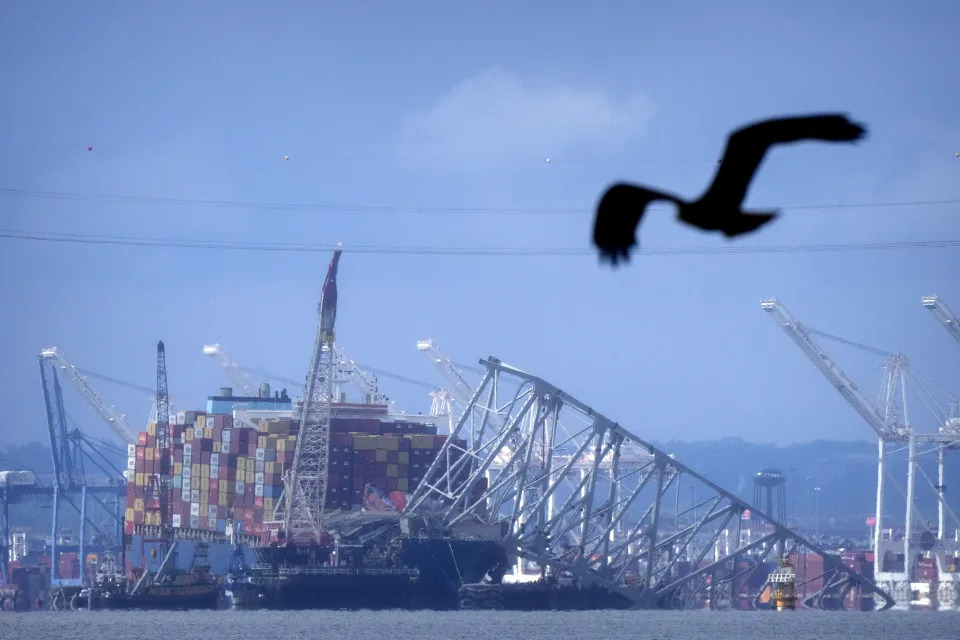LEA SKENE and DENISE LAVOIE
Updated Tue, May 14, 2024








APTOPIX Maryland Bridge Collapse
A bird flies past the collapsed Francis Scott Key Bridge resting on the container ship Dali on Sunday, May 12, 2024, in Baltimore, as seen from Riviera Beach, Md. An effort to remove sections of the collapsed bridge resting on the Dali was postponed on Sunday.
BALTIMORE (AP) — The cargo ship Dali experienced electrical blackouts about 10 hours before leaving the Port of Baltimore and yet again shortly before it slammed into the Francis Key Bridge and killed six construction workers, federal investigators said Tuesday, providing the most detailed account yet of the tragedy.
The first power outage occurred after a crew member mistakenly closed an exhaust damper while conducting maintenance, causing one of the ship’s diesel engines to stall, investigators with the National Transportation Safety Board said in their preliminary report. Shortly after leaving Baltimore early on March 26, the ship crashed into one of the bridge’s supporting columns because another power outage caused it to lose steering and propulsion at the exact worst moment.
The report provides new details about how the ship’s crew addressed the power issues it experienced while still docked in Baltimore. A full investigation could take a year or more, according to the safety board.
Testing of the ship’s fuel did not reveal any concerns related to its quality, according to the report.
The Dali was headed from Baltimore to Sri Lanka, laden with shipping containers and enough supplies for a monthlong voyage.
After the initial blackout caused by the closed exhaust damper, investigators say a backup generator automatically came on. It continued to run for a short period — until insufficient fuel pressure caused it to kick off again, resulting in a second blackout. That’s when crew members made changes to the ship’s electrical configuration, switching from one transformer and breaker system that had been in use for several months to another that was active upon its departure, according to the report.
Investigators stopped short of drawing a direct line between those earlier power issues and the blackout that ultimately caused the bridge collapse.
“The NTSB is still investigating the electrical configuration following the first in-port blackout and potential impacts on the events during the accident voyage,” investigators wrote.
The safety board launched its investigation almost immediately after the collapse, which sent six members of a roadwork crew plunging to their deaths. Investigators boarded the ship to document the scene and collect evidence, including the vessel’s data recorder and information from its engine room, according to board chair Jennifer Homendy. Investigators also interviewed the captain and crew members.
“Our mission is to determine why something happened, how it happened and to prevent it from recurring,” Homendy said at a news conference days after the disaster.
The preliminary report details the chaotic moments prior to the bridge collapse while crew members scrambled to address a series of electrical failures that came in quick succession as disaster loomed.
At 1:25 a.m. on March 26, when the Dali was a little over half a mile away from the bridge, electrical breakers that fed most of the ship’s equipment and lighting unexpectedly tripped, causing a power loss. The main propulsion diesel engine automatically shut down after its cooling pumps lost power, and the ship lost steering.
Crew members were able to momentarily restore electricity by manually closing the tripped breakers, the report says.
Around that time, the ship’s pilots called for tugboats to come help guide the wayward vessel. The tugboats that guided it out of the port had peeled off earlier per normal practice, according to the report. Crew members also started the process of dropping anchor, and the pilots’ dispatcher called the Maryland Transportation Authority Police and relayed that the ship had lost power. The pilots’ dispatcher notified the Coast Guard.
The ship was less than a quarter of a mile from the bridge when it experienced a second power blackout because of more tripped breakers, according to the report. The crew again restored power, but it was too late to avoid striking the bridge.
One of the pilots ordered the rudder turned at the last minute, but since the main engine remained shut down, there was no propulsion to assist with steering, the report says. They also made a mayday call that allowed police to stop traffic to the bridge.
At 1:29 a.m., the 1.6-mile steel span came crashing down into the Patapsco River. The construction workers were sitting in their vehicles during a break when disaster struck.
The last of the victims’ bodies was recovered last week.
One member of the seven-person roadwork crew survived the collapse by somehow freeing himself from his work truck. He was rescued from the water later that morning. A road maintenance inspector also survived by running to safety in the moments before the bridge fell.
On Monday, crews conducted a controlled demolition to break down the largest remaining span of the collapsed bridge, which landed draped across the Dali’s bow, pinning the grounded ship amid the wreckage. The ship is expected to be refloated and guided back to the Port of Baltimore in the coming days.
It arrived in the U.S. from Singapore on March 19, a week before the crash, according to the report. It made stops in Newark, New Jersey, and Norfolk, Virginia, before coming to Baltimore. Investigators said they were not aware of any other power outages occurring in those ports.
They said they’re working with Hyundai, the manufacturer of the ship’s electrical system, to “identify the cause(s) of the breakers unexpectedly opening while approaching the Key Bridge and the subsequent blackouts.”
The board’s preliminary report released Tuesday likely includes a fraction of the findings that will be presented in its final report, which is expected to take more than a year.
The FBI has also launched a criminal investigation into the circumstances leading up to the collapse.

Ship lost power twice before striking Baltimore bridge: probe
AFP
Tue, May 14, 2024

Crews conduct a controlled demolition of a section of the Francis Scott Key Bridge, resting on the Dali container ship, in Baltimore on May 13, 2024 (ROBERTO SCHMIDT)
The container ship that collided with a major bridge in Baltimore, collapsing it within seconds, suffered two electricity blackouts in the moments before the disaster, a preliminary report by federal investigators released Tuesday said.
The Singapore-flagged Dali also lost power during maintenance twice on the previous day, though the report by the National Transportation Safety Board said it was still probing what impact that may have had.
It had been clear that the ship had lost power in the seconds before the stunning collapse.
But the report is the first detailed examination of the events leading up to the disaster, which killed six construction workers who were making repairs on the bridge, and blocked the busy Port of Baltimore, a key US hub.
In a timeline of the accident, it said the Dali was just 0.6 miles from the bridge when the electrical breakers that fed most of the ship's equipment and lighting unexpectedly tripped, causing the first blackout.
The ship lost propulsion and steering and began to drift off course. The crew managed to restore power briefly, but with the Dali just 0.2 miles from the bridge the lights went out again.
An emergency generator gave the crew some steering and they made a hard turn to port -- but without propulsion, the bridge's fate was sealed.
The report also detailed two blackouts about ten hours before leaving Baltimore.
"The first in-port blackout was caused by the mechanical blocking of the online generator's exhaust gas stack. The second blackout in port was related to insufficient fuel pressure for the online generator," it said.
It also said the crew had been tested multiple times, before and after the disaster, for drugs and alcohol, and that none had showed.
In April, the FBI launched a criminal probe targeting the ship, with its agents boarding the Dali as part of the investigation.
President Joe Biden promised last month to "move heaven and earth" to rebuild the bridge, pledging federal funds and saying a new channel for shipping traffic would open by the end of May.
On Monday, crews demolished part of the bridge in a bid to free the Dali, which has been pinned beneath the wreckage since the collapse.
bur-st/md
Baltimore Key Bridge collapse: Cargo ship that caused disaster had 2 power failures before departure
Bradford Betz
Tue, May 14, 2024 a
A crewmember’s mistake caused a Singapore-flagged cargo ship to blackout a day before it crashed into the Francis Scott Key Bridge in late March, causing it to collapse, according to a preliminary report from federal investigators.
The report, from the National Transportation Safety Board (NTSB), determined that a crewmember of the Dali was responsible for accidentally disabling the vessel’s equipment during in-port maintenance while moored at the Seagirt Marine Terminal in Baltimore on March 25. Crewmembers experienced a second blackout due to insufficient fuel pressure for the online generator.
It is still unclear what role these earlier technical malfunctions may have played in the vessel’s loss of power before it hit the bridge.
When the Dali was a little more than half a mile from the bridge in the early hours of March 26, a primary electrical breaker that fed most of the ship's equipment and lighting unexpectedly tripped, causing the ship to lose electrical power and experience another blackout.
FLORIDA BUS CARRYING FARM WORKER CRASHES, KILLING AT LEAST 8 AND INJURING DOZENS MORE: OFFICIALS
The main propulsion diesel engine shut down after the pumps lost electrical power. The ship's crew was able to restore power, then called for an assist from tug boats and the senior pilot ordered the ship's anchor to be dropped.
READ ON THE FOX NEWS APP
A second blackout then happened, and a marine radio call was made to warn waterborne traffic. The ship then struck a main support pier on the bridge, causing it to collapse within seconds.
The ship, which was headed from Baltimore to Sri Lanka, issued a mayday alert with just enough time for police to stop traffic, but not enough to save the bridge workers who plunged to their deaths.
52 CONFIRMED DEAD, 20 MISSING AFTER FLASH FLOODS DEVASTATE INDONESIA'S SUMATRA ISLAND
The board launched its investigation almost immediately after the collapse. Investigators boarded the ship to document the scene and collect evidence, including the vessel's data recorder and information from its engine room, according to board chair Jennifer Homendy. Investigators also interviewed the captain and crew members. The FBI has also launched a criminal investigation into the circumstances leading up to the collapse.
Investigators also planned to review policies, training practices and other factors that could be relevant. And the design, engineering and condition of the bridge would be studied, she said.
On Monday, crews conducted a controlled demolition to break down the largest remaining span of the collapsed Francis Scott Key Bridge, a major step in freeing the grounded Dali container ship.
A full investigation could take a year or more, the NTSB said. The board's preliminary report likely includes a fraction of the findings that will be presented in its final report.
Original article source: Baltimore Key Bridge collapse: Cargo ship that caused disaster
5 takeaways from congressional hearing on Key Bridge collapse, response
Darcy Costello and Alex Mann, The Baltimore Sun
Wed, May 15, 2024

BALTIMORE — A day after a preliminary report revealed new details about what happened in the collapse of the Francis Scott Key Bridge in Baltimore after a vessel strike, members of Congress peppered officials behind the federal response with questions about the ship’s power outage, the safety of other bridges and how to pay for a new bridge.
How might the ship’s power problems have been avoided? How prepared for massive ships was this bridge and others across the country? How should the federal government recoup costs for a new bridge?
In the early morning of March 26, a huge container ship left the Port of Baltimore on a voyage to Sri Lanka, but didn’t make it very far. The 984-foot Dali lost power twice within about half a mile of the Key Bridge and it drifted into one of the bridge’s support piers around 1:30 a.m., collapsing the span and killing six construction workers.
A Coast Guard official said Tuesday that response officials in Baltimore believe the Dali will be refloated and removed from the middle of the waterway “early next week.” The Army Corps of Engineers hopes to reopen the federal channel by the end of May, if not sooner.
Meanwhile, other work remains ongoing. The National Transportation Safety Board, which released its preliminary report Tuesday, continues to investigate the cause of the vessel’s strike. The FBI has a criminal investigation. Transportation officials are planning for a new bridge.
The U.S. House Committee on Transportation and Infrastructure convened Tuesday’s hearing to explore the federal response. Here are five takeaways:
Dali’s power losses were distinct
About 10 hours before it left port, the Dali experienced a pair of blackouts, or complete losses of power, while the crew undertook engine maintenance, the NTSB’s preliminary report revealed.
The power losses in port, originally triggered by a mechanical problem caused by crewmember’s mistake, led the crew to switch the ship’s power supply to a different electrical transformer and circuit breakers, the report said. Those breakers tripped twice as the ship approached the bridge, rendering it mostly rudderless and without propulsion as it plowed into the support pier.
During her testimony, Homendy distinguished the Dali’s four power outages.
“Preliminary information indicates that the March 25 blackouts were mechanically distinct from those that occurred on March 26,” Homendy told lawmakers. “Two were related to routine maintenance in port. Two were unexpected tripping of circuit breakers on the accident voyage.”
Figuring out what caused the breakers to trip as the Dali approached the bridge is at the center of what Homendy described as an investigation of “unprecedented” scale for her agency, which probes transportation disasters with the goal of preventing future tragedies, not holding anyone accountable.
“Switching breakers is not unusual but may have affected operations the very next day on the accident voyage,” Homendy testified. “So the configuration of the breakers remains under investigation.”
Coast Guard to assess major ports
The Key Bridge collapse spawned numerous questions about the safety of maritime operations around American ports and infrastructure.
Coast Guard Vice Adm. Peter Gautier said Wednesday that those questions warrant immediate attention, and that officials can’t wait until the conclusion of federal investigations into the disaster in Baltimore for answers.
“While we look forward to the results of these investigations, it is evident, looking more broadly, that the size and complexity of ships has grown over the years, placing greater demands on our marine transportation infrastructure that may not have kept pace with the increased risk that these vessels pose,” Gautier testified. “It’s time for us to more broadly understand these risks.”
Gautier told lawmakers he was convening a “nationwide Board of Inquiry” to evaluate the efficacy of the Coast Guard’s risk management resources and how they’re being put to use in major ports.
Describing the probe as a critical step to ensure “safe and secure flow of commerce on our waterways,” Gautier said it would “establish a holistic national level approach to develop risk profiles, identify ways to address vulnerabilities and propose actions to reduce the risk of major incidents.”
Homendy said she was “very encouraged” to hear the Coast Guard’s plan for a board of inquiry for ports across the country.
Questions over funding bridge reconstruction
President Joe Biden has pledged that the federal government would pay entirely to rebuild the bridge. But if Congress is fronting the cost of a new bridge, anticipated to approach a price tag of $2 billion, committee members asked Tuesday, how can it expect to get some money back?
Shailen Bhatt, administrator of the Federal Highway Administration, told lawmakers that under existing rules, any insurance funds recovered after an “emergency relief” event go back into the emergency relief fund. That program covers most of the costs of repairs to damaged roads and bridges following natural disasters and external catastrophic failures.
The roughly $1.7 to $1.9 billion emergency relief request related to the Key Bridge collapse is the second-largest ever received by the Federal Highway Administration, according to Bhatt. It is second to a $2.2 billion request made following Hurricane Katrina, he said Wednesday.
Bhatt also acknowledged, in response to lawmakers’ questions, that the Key Bridge had been redesignated following the collapse as part of the interstate highway system, rather than a state facility. That redesignation means it will be eligible for 90% or more of the costs to be covered by the federal program, rather than the 80% it would have qualified for without the designation.
The Federal Highway Administration has told Maryland officials that they “believe” emergency relief funding will be available, which Bhatt said helps to relieve some “uncertainty.”
“I can pretty much with certainty guarantee this will not be 100% federally funded eventually, because we will recoup all of the insurance payments … and they will go back into the [emergency relief] funds,” Bhatt said. “But as the ranking member mentioned, we don’t want to wait through all of the litigation and the NTSB investigations, insurance issues, for that.”
Questions linger about pier protection — for Key Bridge and others
The NTSB’s preliminary report noted that the Key Bridge had four dolphins, or island-like structures in the water, designed to protect its piers — two on each side of the bridge.
But those devices didn’t stop the drifting Dali from striking one of the bridge piers, which was surrounded by timber, concrete and steel. The surrounding protection remained relatively tight to the pier itself, Homendy said Wednesday, and the dolphins were “rather small.”
She said the NTSB has been comparing the Key Bridge to others that “have pier protection that comes out farther, so that a vessel can’t get to the column” and larger dolphins.
“In this situation, you have a bridge that began operations in 1977. If it was built today, it would be built differently,” Homendy said. “That has to be taken into consideration.”
She urged other bridge owners to conduct risk assessments of their own bridges with this in mind, alongside the growing size of containerships. It’s not necessary to wait until the NTSB investigation is complete to evaluate how protected a bridge is, she said.
“From a risk assessment standpoint, what is now going through? What is the vessel traffic? And how is our infrastructure protected?” Homendy suggested bridge owners ask.
Ancient law used by companies behind Dali may get fresh look
Less than a week after the Dali crashed into the bridge, the Singaporean companies that own and manage the ship cited a pre-Civil War law enacted more than a century ago to llimit or eliminate their liability in the disaster.
On April 1, Grace Ocean Private Ltd., the owner, and Synergy Marine Pte Ltd., which manages the 984-foot cargo ship, asked a federal judge in Maryland to clear them from liability or limit damages to the salvage value of the ship plus the revenue it stood to make from its cargo, which they estimated at $43.7 million.
In order to be successful, the companies have to prove they did nothing wrong. The City of Baltimore and a group of businesses argued in lawsuits they were negligent in allowing an allegedly unseaworthy vessel to sail.
No matter how the case plays out, one lawmaker said Wednesday, the law, designed to protect the maritime industry, needs to be reevaluated.
The Limitation of Liability Act of 1851 “really has to change,” said U.S. Rep. John Garamendi, a Democrat from California.
He told fellow lawmakers he intended to introduce legislation that would ensure “the owners of these vessels would be held responsible for the costs of their mistakes.”
-------
Power outages and an urgent warning: NTSB details Dali crew’s scramble before Key Bridge collapse
Darcy Costello, Alex Mann, Baltimore Sun
Wed, May 15, 2024

Two electrical blackouts on the Dali freighter sent members of its crew and the pilots on board scrambling to control the vessel as it approached the Francis Scott Key Bridge in the early morning hours of March 26.
Their efforts — which would prove unsuccessful — are laid out in detail in a preliminary report released Tuesday by the National Transportation Safety Board.
The 984-foot container ship struck the bridge just before 1:30 a.m. March 26, collapsing much of the 1.6-mile span into the Patapsco River and killing six construction workers who were repairing potholes.
The preliminary report offers no conclusions or likely causes, but does present a minute-by-minute — sometimes second-by-second — account, including key radio broadcasts and actions like the Maryland Transportation Authority Police swiftly shutting down bridge traffic.
Here’s how federal investigators say things played out:
Afternoon, March 25: About 10 hours before its departure from the Port of Baltimore, the Dali experiences two electrical blackouts during in-port maintenance. In the first, a crew member mistakenly closes an exhaust damper, stalling the engine. A second blackout occurs when insufficient fuel pressure slows a generator.
12 a.m. March 26: Seven construction workers, accompanied by one inspector, repair potholes in the southbound lanes of the Key Bridge. Maryland Transportation Authority Police units are stationed at either end of the bridge.
12:05 a.m. A senior pilot and an apprentice pilot, both with the Association of Maryland Pilots, board the Dali. The captain reports to the pilot that the ship is in “good working order,” according to NTSB investigators.
12:36 a.m. The Dali is pulled away from a dock in the Port of Baltimore by two tugboats, the Bridget McAllister and the Eric McAllister.
1:07 a.m. The Dali enters the Fort McHenry Channel and, around the same time, the senior pilot gives orders for the tugboats to depart, as is “normal practice,” according to the NTSB. The senior pilot turns over control to the apprentice pilot.
1:09 a.m. The vessel’s speed is increased from “dead slow ahead” to “slow ahead.”
1:25 a.m. The first blackout occurs, about 0.6 miles away from the Key Bridge — or, as the NTSB noted, three ship lengths. The Dali experiences a loss of electrical power to its lighting and most equipment, resulting in its propeller stopping along with its three steering pumps, which means the rudder cannot be moved.
1:26 a.m. The apprentice pilot calls the pilot dispatcher by cellphone as the senior pilot takes control. The pilots call for assistance from a tugboat; the Eric McAllister, 3 miles away, immediately heads that way, but doesn’t reach the Dali in time. After an emergency generator starts, restoring partial power to the rudder, the senior pilot orders the vessel turned 20 degrees to the left.
1:27:01 a.m. The pilot dispatcher tells the Maryland Transportation Authority Police’s duty officer that the ship lost power, and then informs the Coast Guard. At the same time, the senior pilot orders an anchor to be dropped and the crew begins to do so. The Dali suffers a second electrical blackout, this time about 0.2 miles from the bridge.
Related Articles
Local News | Ship that collapsed Key Bridge lost power twice the day before crash, report finds
Local News | Explosives break up Key Bridge section atop Dali | VIDEO
Local News | Explosives break up Key Bridge section atop Dali, readying to refloat vessel
Local News | Maryland AG asks to hire 5 law firms to help with Key Bridge litigation
Local News | All formerly trapped vessels by the Key Bridge collapse depart port ahead of controlled explosion
1:27:23 a.m. The pilot orders a sharper turn to the left, but the main engine is shut down and there is no propulsion to power the maneuver.
1:27:25 a.m. A pilot issues a warning to other boats over a very high frequency (VHF) marine radio.
1:27:32 a.m. The crew manually closes breakers, regaining electrical power for the ship but not propulsion.
1:27:53 a.m. The duty officer with the Maryland Transportation Authority Police orders the police officers at either end of the Key Bridge to close it to traffic.
1:29:10 a.m. The Dali strikes the southern pier supporting the central span of the Key Bridge, sending it tumbling into the Patapsco River along with seven construction workers. A Dali crew member told investigators that the ship struck the bridge as he was releasing the brake on the port anchor, and he had to run to escape pieces of the bridge falling on the bow. Another crew member is injured escaping debris. A road maintenance inspector on the bridge is able to run to safety by reaching a span of the bridge that didn’t collapse.
1:34 a.m. The Coast Guard issues urgent notice, requesting assistance.
1:51 a.m. The first Coast Guard boats arrive on the scene.
1:55 a.m. A construction worker, who fell from the bridge in his truck but escaped the vehicle, is rescued by a Maryland Transportation Authority Police boat.
The search for the other workers continued through the day before efforts shifted to recovery. All six bodies have now been recovered with the last found last week.
Authorities also have been removing the bridge wreckage from the shipping channel and, on Monday, used explosives to cut the bridge trestle draped across the bow of the Dali as part of the effort to refloat the grounded ship.

